THE ALGERIAN WAR
4. THE REBELLION AND ITS ACCOMPLICES (1954-1956)
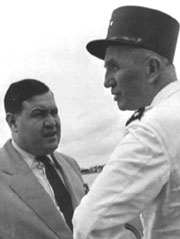
GENERAL Boyer de la Tour, resident general in Tunisia, relates : « In October 1954, I inspected the 5th Goum, which had in its ranks some Chaouis from the Aurès region. They said to me : “ Sir, we have heard much about you; we know you, and we are your soldiers. An uprising is being prepared among our brothers in the region of Aurès in Algeria. You must prevent it, for once the revolt is launched, God alone knows whether it will be possible to stop it. ” » 1 The anxious general went to Paris and spoke with the Prime Minister Mendès-France, who merely smiled.
We know what happened. During the night of November 1st, 1954, the Algerian insurrection broke out. From the region of Algiers to Oran, several bombs and assassinations were reported. Around Constantine, the attacks were more serious. Barracks, administrative complexes, and the small town of Arris in Aurès were attacked, and lives were lost. But we will particularly mention the following drama : a small group of armed individuals stopped a bus on the way to Tilfelfel, south of Constantine, near the gorges of Tighanimine. Guy Monnerat, a 23 year-old teacher, was killed as well as a Kaid, Hadj Sadok, a veteran from the Army of Africa. Mme. Monnerot, 21 years old, was left for dead. This was “ Bloody All Saints Day ”.
A REVOLUTIONARY WAR
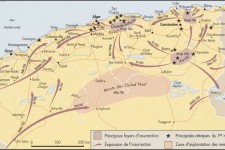
Responsibility for these crimes was claimed in a tract addressed to the Algerian people : « Our reform movement presents itself under the label – Front de Libération Nationale (FLN; National Liberation Front)[and its aim is]: national independence. » Philippe Tripier analyses as follows the aim of the FLN : « The rebellion began on November 1st, 1954 and initially had very few means. So few did it have that, reasonably thinking, it had scarcely any hope, and even less likelihood of achieving its ends. Let us be the judge : a few hundred bad rifles, as many fighters based for the greater part in the Aurès massif, and the rest in the Great Kabylia massif; an overwhelmingly indifferent Algerian population, and, according to the leaders of the conspiracy, not aroused by the national consciousness; finally, a worldwide opinion alien to the problem...
« Since the Algerian people have not rebelled spontaneously and are not disposed to do so, the problem of independence was not essential in itself; it had to be created. [...] » 2
For the terrorists, it was a question of waging a very particular type of war that had just proved its worth in Indo China : revolutionary war. It consists not in occupying a territory, but in conquering its population whether they liked it or not. During 1955 and 1956, the first two years of the conflict, the FLN would attempt in vain to rouse the Algerian Muslims to join the rebellion.
THEIR INSTRUMENT : TERROR
The FLN was a movement that came from the Organisation spécial (OS; Special Organisation), the terrorist branch of Messali Hadj’s Marxist movement : the “ Mouvement pour le Triomphe des Libertés Démocratiques ” (MTLD; Movement for the Triumph of Democratic Liberties). Shortly before, in the spring of 1954, twenty-two activists of the OS had decided to split away and chose a directory : the “ Committee of Nine ”. These men proclaimed themselves the historical leaders of the FLN. The Front inherited from the OS its revolutionary character and its method : terror. It always excluded Communists to avoid having to submit to them, but nevertheless it kept their methods and their Marxist dialectic. The FLN also used the ulemas to rouse the peasant masses to fanaticism and to justify the acts of slaughter that they would commit in the name of Islam. Finally, the “ Union Démocratique du Manifeste Algérien ” (UDMA; Democratic Union of the Algerian Manifesto) led by Ferhat Abbas, also contributed to the expansion of the FLN by stirring up the Muslim middle-class and awakening French public opinion to its claims.
The FLN structure was based on a political and administrative organisation (OPA) composed of cells scattered in villages and immersed in the masses. In each cell, there was a killer, a fund-raiser, a propagandist and a cell leader. This team went into action by enslaving the population through blackmail and subjecting “ collaborators ” to terror.
THE PHILIPPEVILLE MASSACRE
For French Muslims, nothing was more unnatural than this bloody rebellion. There is nothing more opposed to historical truth than a massive uprising of the Algerian people against colonial France.
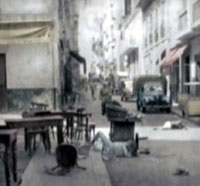 The FLN leaders could but take note of this strong reluctance that their co-religionists showed towards them. Zighout Youssef, the rebel leader in the area (or wilaya) of North Constantine, a fanatical supporter of jihad, understood that it would be necessary to dig a gulf of blood between Muslims and Europeans so as to create an irreparable situation and to make any rapprochement between the two communities forever impossible. On August 20, 1955, in Philippeville, 51 Muslins and 71 Europeans, the elderly, women and babies included, had their throats slit, were disembowelled or dismembered. And what can be said of the El Hadia slaughter on the same day ? Dreadful... The police intervened but were unable to prevent reprisals by the Europeans, who were tried beyond endurance. 1,273 deaths were registered. Europeans were gripped by fear and Muslims with resentment.
The FLN leaders could but take note of this strong reluctance that their co-religionists showed towards them. Zighout Youssef, the rebel leader in the area (or wilaya) of North Constantine, a fanatical supporter of jihad, understood that it would be necessary to dig a gulf of blood between Muslims and Europeans so as to create an irreparable situation and to make any rapprochement between the two communities forever impossible. On August 20, 1955, in Philippeville, 51 Muslins and 71 Europeans, the elderly, women and babies included, had their throats slit, were disembowelled or dismembered. And what can be said of the El Hadia slaughter on the same day ? Dreadful... The police intervened but were unable to prevent reprisals by the Europeans, who were tried beyond endurance. 1,273 deaths were registered. Europeans were gripped by fear and Muslims with resentment.
For the FLN, it was a victory. It then had to enlarge the wound by organising other acts of pillage and slaughter. In May 1957, it had been responsible for 1,800 cases of arson on farms, slitting the throats of or stealing 80,000 head of cattle, and the destruction of 12,000,000 grapevines. The FLN wanted first to kill Europeans and the Muslims whose spirit of justice and qualities of heart were factors that contributed to harmony existing between the communities. This conduct would acquire such an official character that in 1959 Krim Belkacem, who became the FLN’s “ Minister of War ”, declared cynically to journalists : « Assassination is proof of the preparation and the aptitude of new recruits : a new recruit must kill at least one colonialist or known traitor ». Such was the infernal mechanism that the FLN set in motion.
1. THE BETRAYAL OF THE REPUBLIC
Since the Muslim population were what was at stake in the fight; it was a question of knowing to whom they would turn in the end : to the FLN or to France. In their heart of hearts, there is no doubt that they were attached to France; but their attitude naturally tended to model itself on the side that would show itself the strongest and most determined. The insurgents proved to be diabolically determined and intransigent. Banking on France capitulating in the end, they demanded unconditional Algerian independence from the beginning. Never did they deviate from this line of conduct.
As for the French government, it mapped out its political line from day to day, calculating trends of opinion and the enemy’s intentions. One day it was resolved to fight the FLN, and the day after, it negotiated with the rebels. By its sudden fits of energy, it maintained the illusion among Europeans that it was determined to remain in Algeria, while in fact it was slowly slipping into capitulation.
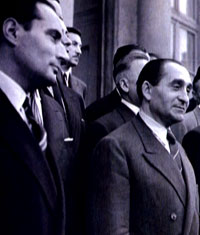 Mendès-France and Mitterrand clearly declared that “ Algeria was France ” and that secession was inconceivable. Nevertheless, they recommended the Armed Forces to apply only « limited repression ». The result was that among the 1,270 suspects arrested during the first weeks of November, only about thirty of them were imprisoned... then liberated. Jacques Chevallier, the mayor of Algiers who became Secretary of State for War; informed the rebels of police and army activities, with the sole aim of keeping the votes of the MTLD in the coming elections. Such is democracy : without a twinge of conscience the population is handed over to cutthroats in order to win a few votes.
Mendès-France and Mitterrand clearly declared that “ Algeria was France ” and that secession was inconceivable. Nevertheless, they recommended the Armed Forces to apply only « limited repression ». The result was that among the 1,270 suspects arrested during the first weeks of November, only about thirty of them were imprisoned... then liberated. Jacques Chevallier, the mayor of Algiers who became Secretary of State for War; informed the rebels of police and army activities, with the sole aim of keeping the votes of the MTLD in the coming elections. Such is democracy : without a twinge of conscience the population is handed over to cutthroats in order to win a few votes.
In February 1955, the government appointed Jacques Soustelle Governor-General in Algeria. He thought that he would be able to apply a « very liberal » policy in Algiers. He discreetly helped Ben Boulaïd, one of the “ Historic Nine ” to escape, since he thought that he could use him as a “ valid interlocutor ”.
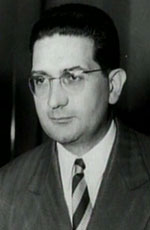
Soustelle had not understood that one cannot come to terms with terrorists. He only came round two months later when the Philippeville massacre took place and went to the scene of the crime. There then occurred a phenomenon that would repeat itself often during the Algerian war. Won over by belief in French Algeria, Soustelle understood that negotiations with rebels were useless, but « his conversion did not go so far as to open his eyes to his Gaullist [and Socialist] error. » 3
The Mendès government was brought down on February 5, 1955, and Edgar Faure replaced him for... nine months ! But that was sufficient to bring Bourguiba back to Tunis and to prepare Muhammad V’s return to Morocco, without thinking for a moment that the Algerian felaghas would then receive help and support from these two bordering countries that had so easily attained independence. What encouragement for the FLN ! What a danger for the populations of these lands and what a source of trouble for our soldiers ! But there was something even worse.
NEGOTIATIONS WITH THE FLN
Edgar Faure let the domestic situation in Algeria worsen, and public opinion was marked by alarm. The government collapsed at the end of November and was soon replaced by the team of Mollet and Mendès, which were always the same finally !
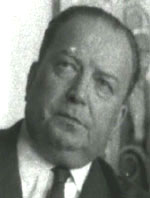
On February 6, 1956, Guy Mollet was welcomed in Algiers with insults, and tomatoes thrown not by colonialists but by the lower classes of Algeria, which his party believed it represented. He appointed a dynamic man as Governor-General, his friend, the Socialist Robert Lacoste. Like Soustelle, Lacoste was led to silence doctrinaire ideology before Algerian reality… for a short time at least ! Mollet, moreover, decided to call up the conscripts, who would number 400,000 men by the end of 1956. « From this point on, French peace would have been possible, Reunier wrote, if the government had been determined to play according to the rules of the game that resulted from dispatching the conscripts, i.e., to tolerate no infiltration from Tunisia and Morocco, and not to continue a policy of weakness on the wings while intending to maintain French Algeria at their centre. » 4
After each burst of energy, treason undermined it. Back in France, Mollet yielded to the entreaties of his friends who made him believe that the remedy lay in negotiation with rebels. In October 1956, military intelligence reported that Ben Bella, the leader of the foreign delegation of the FLN, accompanied by four terrorists, would take a plane for a trip to Morocco and Tunisia. The military and civilian authorities of Algeria decided to inspect the plane. What a round-up ! Five terrorists, and by no means the least, were all arrested at the same time. Ben Bella was found with banknotes, a submachine gun, as well as documents revealing that negotiations were in progress between Guy Mollet and the FLN !
By its liberal politics, the French government pressed the Muslims into rebellion as much as the FLN did.
THE ARMY OF AFRICA CRUSHED
Before the arrival of the conscripts, the police tried to quell the rebellion, but with means that were laughable. The Gendarmerie had only 2,200 officers in its ranks, and the army could only provide 15,000 men trained for carrying out operations, who had to be sent to 7,500 known trouble spots.
If only it had been just a lack of personnel ! Officially, France was not at war in Algeria. Consequently, each action undertaken by the army was controlled by the Gendarmerie, which wrote a statement for each operation. When an armed terrorist was killed, the soldier who had killed him stood trial as if for a crime under the common law ! And when a suspect was arrested, the case file with the names of the witnesses for the prosecution was communicated to the defence lawyers, that is to say, to the accomplices of the FLN. In the week following, most of the witnesses and their families were found with their throats slit.
The Communist daily, Alger Républicain multiplied its accusations against the army. A vitiated debate poisoned the atmosphere, exacerbated hatred, provoked desertions with tragic consequences.
To prevent these ever more frequent betrayals, all the regiments composed of indigenous soldiers were repatriated to Europe in a few months time : thirty thousand soldiers were sadly lacking before the levying of the Harki.
THE WEAKNESSES OF THE ARMY
If the army had not yet obtained many good results, it was due to its lack of method.
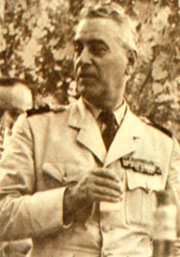
Fortunately, in July 1955, General Lorillot was appointed Commander-in-Chief. Cold and uncompromising, this veteran of Indo China knew what a revolutionary war was. His plan was to occupy the entire territory by making subdivisions, depending on the density of population to protect. « In the less populated and remote regions, the population that was taken in charge was evacuated, and the deserted area that was thus created was classed as a “ forbidden zone ”. In the wealthier and more populated regions, complete protection for Europeans and Muslims had to be assured. The companies were spread over the terrain, one company for 100 km2, to protect people, to allow agricultural work to continue, etc. These pacification zones required a large number of soldiers. In the rest of the country, the army occupied the main centres and tracked down the rebels. These were the “ operational zones ”. »5
The country was thus “ divided into controllable zones ”. But what was beginning to be called “ pacification ” swallowed up human potential and, moreover, required experienced soldiers. The first problem was resolved in February 1956 with the arrival of the conscripts.
Most of the experienced soldiers arrived during 1956 : they were veterans of Indo China. They experienced the unpleasant feeling of “ déjà vu ”, and hesitated before once again demanding loyalty from populations only to abandon them in the end to the knives of cutthroats. Of course, they worked conscientiously, but reports on troop morale show that they went there unwillingly. The Suez affair would fully confirm their fears.
THE SUEZ AFFAIR
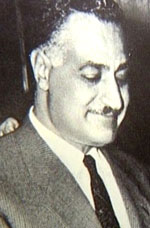
This unfortunate episode demonstrates the weakness of our diplomacy compared to that of the United States and the Soviet Union, the Big Two, who were conspiring to make us leave North Africa. In July 1956, the Egyptian dictator Nasser arbitrarily decided to nationalise the Suez Canal. This was an unacceptable decision for Great Britain, for which the Canal was a vital link with the Commonwealth. France could not accept it either, and since Nasser had been supporting the Algerian rebellion for two years by means of his radio propaganda, by the hospitality that he offered to FLN leaders and by his material assistance, she saw a further reason to intervene.
Our Father published two articles on this subject, under the pseudonym of Roland Desprée, in Amitiés Françaises Universitaires, the paper of the students from Action Française. The first one, dated December 1956, demonstrates that the UN is a warmonger in each of its interventions. The second one, a review of the investigation of the journalists Merry and Serge Bromberger, explains how the expedition to Egypt was a military victory and a political defeat.
« Our diplomacy put up with everything; it protected nothing, safeguarded nothing, helped nothing. » The French government, in fact, accumulated diplomatic errors. The first one was to delude itself about its “ allies ” : Great Britain, which was represented by the liberal Eden, and the United States, whose Secretary of State, Foster Dulles, had been sent to Europe by Eisenhower to further their anti-colonial policy. France found her most determined partner in Ben-Gurion, Prime Minister of Israel.
As early as August, the majority of the English condemned resorting to force. Now, the French government made another error in unconditionally relinquishing command of the expedition to the British in order only to obtain their participation.
ALLIES OR ENEMIES ?
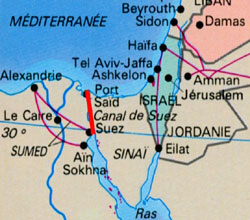 The scenario unfolded as planned. Israeli troops attacked the Egyptians on October 29. The Franco-British ultimatum was issued the following day. Israel accepted the ultimatum, Egypt refused it. Port Said was bombarded and on the morning of the November 5 the English and French parachuted over the canal. Château-Jobert’s 2nd regiment of colonial paratroops brilliantly obtained its objectives, and was soon joined by the 1st foreign paratrooper regiment. A routed enemy left open the roads to Cairo and Suez.
The scenario unfolded as planned. Israeli troops attacked the Egyptians on October 29. The Franco-British ultimatum was issued the following day. Israel accepted the ultimatum, Egypt refused it. Port Said was bombarded and on the morning of the November 5 the English and French parachuted over the canal. Château-Jobert’s 2nd regiment of colonial paratroops brilliantly obtained its objectives, and was soon joined by the 1st foreign paratrooper regiment. A routed enemy left open the roads to Cairo and Suez.
Yet the British general Keightley slowed the progress of the French.
In the evening of November 5, Soviet Field Marshal Bulganin sent a message to Paris, London, Tel-Aviv and Washington, in which he stated that he « was fully determined to resort to force to crush the aggressors and to restore peace in the Middle East ». As if by chance, transmissions became bad between Port-Said and Cyprus, but also between Cyprus, Paris and London. It was impossible to give clear orders or to inform the government of the real situation in the field.
The French ambassador to London, Mr. Chauvel, was convinced that the Soviet ultimatum was a bluff and emphasised the urgency of accelerating operations to impose a fait accompli. In London, however, people feared nuclear missiles. In Tel-Aviv, Ben-Gurion gave his consent for the ceasefire. In Washington, it was proposed that « immediate and decisive measures be taken, in collaboration with USSR, in order to end the act of aggression and to prevent war ».
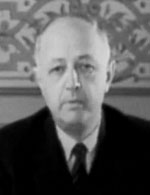
A high-ranking Soviet official confided to Christian Pineau, our Foreign Secretary : « We did not think that you would take our threat literally; on the other hand, we were sure that the Pentagon would act as if it were a tragedy. »
Yet, at the same time that it prevented us from protecting our interests in Africa, the USSR was bloodily quelling the insurrection of Budapest, with a dreadful toll of twenty-five thousand victims !
Eden decided to terminate the operation and informed Paris about his unilateral decision. Mollet gave vent to his indignation but confirmed the order. The ceasefire was set for the evening of November 6 at midnight, when one more day would have been enough for a complete victory. There was dismay among the paratroopers, whose advance was suddenly brought to a halt. It is understandable !
The fiasco was complete because the affair had dragged on too long, and when the landing finally took place, the real battle had already been lost... in the UN. This diplomatic defeat strengthened Colonel Nasser’s prestige, toughened the stand taken by the Algerian rebels and made the populations lose confidence in our determination. The French units returned seething with bitterness.
THE UN IS WAR !
Between the shot fired from a fanatical Arab’s popgun or the insults of Nassar and the proportioned and limited riposte of a French policeman or a detachment of paratroopers, sits the World Parliament that must discuss them and then take it upon itself, either to congratulate by a massive vote the insolent brigand and thereby giving him world-wide prestige, or to make this miniscule operation the principle of a general war ! It is the UN that paralyses the free world […]. It is the UN that lessens, that weakens the power and initiative of the nations that are subject to it to the sole benefit of the Soviet world. It is the UN that, out of utopia and international demagogy, establishes the authority of Nasser and other crooks. When the mask falls, it is the moralising and apolitical hegemony of Puritan America that seeks to extend itself to our detriment, without understanding that it plays into the hands of the active political power, the Soviet one.
Abbé de Nantes, December 1956.
FAILURE OF AN INSURRECTION
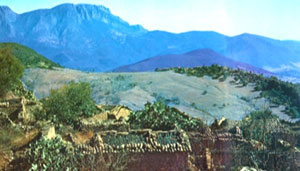
In August 1956, the leaders of the rebellious wilayas secretly met in the valley of the Soummam, for a so-called « national » conference. The final declaration prided itself on having involved the whole country in its revolution and having posed the « Algeria problem ». In two years, the number of rebels had risen from several hundred fighters grouped in the east of Algeria to twenty thousand throughout the entire territory, to whom about a hundred thousand sympathisers may be added, that is to say, in total 1.5 % of the population. Yet one cannot speak of a « national » insurrection. As Philippe Tripier observes : « Two long years only to succeed in involving a country in a war is much too long to give the impression of a mass uprising ».6 At the end of 1956, 6,352 Muslim deaths were registered compared to 1,035 of European origin. Multiply these numbers by four, and even ten, for the number of mutilated and wounded persons. This revolution was absolutely not a spontaneous mass movement because the logic of a revolt against France would have required an inverse proportion.
How then was it finally able to triumph six years later ? Through the treason of moralists, among the first of whom were the clergy.
2. THE TREASON OF THE CLERGY
PRO-FLN PRIESTS
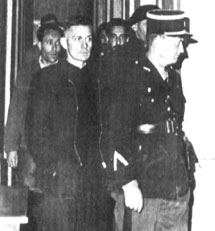 On April 16, 1956, three Mission de France priests who had charge of the parish of Souk-Ahras, the ancient Tagaste where St. Augustine was born, Frs. Louis Augros, Johic Kerlan and Pierre Mamet were given notice by the city superintendent of expulsion decrees that had been issued against them. This measure, which came under the special powers granted to the prefects of Algeria by the Mollet government, came as a bombshell. For the first time since the beginning of the Algerian war, Catholic priests were suspected of having links with the fellaghas.
On April 16, 1956, three Mission de France priests who had charge of the parish of Souk-Ahras, the ancient Tagaste where St. Augustine was born, Frs. Louis Augros, Johic Kerlan and Pierre Mamet were given notice by the city superintendent of expulsion decrees that had been issued against them. This measure, which came under the special powers granted to the prefects of Algeria by the Mollet government, came as a bombshell. For the first time since the beginning of the Algerian war, Catholic priests were suspected of having links with the fellaghas.
« At the Mission de France, many of us “ did odd jobs ” for the FLN, without it being known », one of them boasted.7
They were not the only ones. Fr. Christian Delorme, a Prado priest in Lyon, today testifies : « In my parish of Saint Andrew, I met Prado priests who I sensed were supportive of the struggle for the independence of Algerians. »8
THE PROGRESSIVIST CONTAMINATION
This collusion, praised by some people, was a cause of scandal for many others. « Strange alliances had been forged between the FLN and certain Frenchmen in the name of Christ and of History to save us from error and evil. We no longer understood. To the great sorrow of many priests, and of the Bishops of Oran and Hippo, the Archbishop of Algiers, Léon Duval, fascinated by Islamic piety, and following his example certain parishes, certain convents and monasteries, put the cross to the service of the crescent. They offered help and care to the terrorists in their own home or through networks of the faithful. » 9
Through what aberration did these priests take the rebels’ side ? Our Father would explain it several years later :
« In the progressivist’s mind Christian Faith is first confused with any ideal that has generous pretensions : he confuses the supernatural evil of sin with the political or social evil that these movements denounce for their failure to satisfy the flesh : in place of the One Saviour, he substitutes any man who emerges and offers temporal salvation, and he reaches the point where he prefers the hope for a new, terrestrial paradise to the supernatural hope for Heaven. This confusion leads to a contamination of both spheres. Our religion – even in the pulpits in our churches – is impregnated with allusions to political and social stands as if the first and principal effect of the life of grace were to plunge us into such conflicts. Politics on the other hand, takes on a mystical aspect, as though it received from religion the significance and urgency of a holy war... so much so that the progressivist Christian, be he priest or militant, can only channel his ardour into some revolutionary movement where it will find free rein. If anything, they even add to the agitation in the name of the Gospel ! » 10
The Lazarist Fr. Schörung, chaplain at Mustapha Hospital in Algiers, admitted that our Father was right when he wrote to him on November 5, 1963 : « The secret action of the Communists has been less important, by giving its methods to the revolt, than that of liberal Catholics, who give it its spirit and its reason for revolt with the religious guarantee of Christianity. »
COVERED BY ROME AND ALGIERS
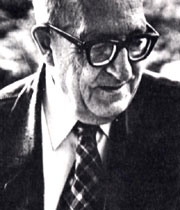
This distorting of Christian Redemption into revolutionary liberation was not suspected in high places. It was even encouraged, if not in practice, at least in principle. In October 1962, the very progressivist Georges Hourdin, a journalist for La Croix, congratulated himself on the collusion of his friends with the fellaghas, who were covered from the beginning by the Church authorities:
« It happened that their political action sometimes encountered that of the Communists or of all those who, on the troubled surface of the globe, now fight for their liberation. This encounter took place, in any case, during the event we are studying here, not without clashes and torments, during the seven long, bloody years that the Algerian war lasted. One fact made everything possible for Catholics. From the beginning, the Hierarchy took a clear stand in favour of the rebels. It did so from the Vatican down to the bishop’s house in Algiers, by way of the Assembly of cardinals and archbishops. It is from Rome that the impulse came. Pius XII at first, then John XXIII, had both been favourable to the independence of the formerly colonised nations. »11
In his radio message at Christmas 1954, Pope Pius XII in fact denounced the « nationalist policy » and the « nationalist State » as the only abettors of evil : « Among some peoples hitherto considered as colonials, the process of evolution towards politic autonomy, that Europe should have guided with foresight and attention, quickly became an explosion of nationalisms greedy for power. It must be admitted that these unexpected [sic !] fires to the detriment of the prestige and interests of Europe, are, at least partially, the fruits of its bad example. »
A priest passing through Kabylia wrote : « The Church is in the process of taking an important place in this country bathed in blood, the one that suits it. It is almost an “ epiphany ” […]. The present situation leads Christians to reflect on the past, on the responsibilities of the French community. Muslims are also turning towards the Church. The letters of the bishops are read, even duplicated by them. Many discover, for one or two years, that Catholicism is something other than the religion of the French... » (quoted from the Documentation catholique of December 9, 1956)
« THE BETRAYAL OF MORALISTS »
To face such a betrayal, only one man of the Church stood up. During the autumn of 1956, Fr. de Nantes signed his name to a series of articles in the review L’Ordre français, true masterpieces of political morality, or to express it better : of total wisdom and courageous charity.
 In the first one, entitled “ Betrayal of the moralists ? ”, he straightaway observed : « When the French Army fights against a handful of “ outlaws ” who kill, rape, commit arson and murder, there are intellectuals who morally justify the bandits and incite us to pity their fate. It is well known that God has condemned homicide, and this is enough to condemn the “ repression ” carried out by the regular army ! The same sentimentalism, – we do not dare speak here of mischievousness –, that aims at inciting the unsuspecting reader to pity the real assassin and to wax indignant in the name of morality against the one who corrects and represses him. »
In the first one, entitled “ Betrayal of the moralists ? ”, he straightaway observed : « When the French Army fights against a handful of “ outlaws ” who kill, rape, commit arson and murder, there are intellectuals who morally justify the bandits and incite us to pity their fate. It is well known that God has condemned homicide, and this is enough to condemn the “ repression ” carried out by the regular army ! The same sentimentalism, – we do not dare speak here of mischievousness –, that aims at inciting the unsuspecting reader to pity the real assassin and to wax indignant in the name of morality against the one who corrects and represses him. »
The misfortune is that since 1944 we had lost all sound notion of political morality that would allow us to establish in an objective way where justice and the essential injustice lie :
« It is nevertheless the sacred treasure of our civilisation, one of the main benefits of Christianity, and the secret motive for French expansion in the world. Still, that it should happen that some Frenchmen should free themselves from it, is already very sad. Yet, that partisan journalists and intellectuals should wish to ignore it in order to serve the mighty of today and tomorrow, that is all well and good, although these paltry Machiavellis should hesitate somewhat before throwing the country into an adventure so contrary to our national tradition. But that one should persist in seeking in Christian morality itself something to justify anarchy and rebellion in order to force the hand and conscience of a sensible people averse to disorder, a people whose mistrust has been aroused by the atrocities of international Communism, that is an appalling crime. And that no one should defend our moral heritage, our consciences, and holy justice, this is what is the most worrisome at the present hour. »
Classical morality not only respected the established, traditional, legitimate order, in the case in point the colonial order, but it also needed to refer to this order, to be able to correct in its name the abuses and faults committed within this order. In our beautiful Algeria of 1956, there certainly existed important shortcomings, flagrant and even scandalous injustices due to underemployment and the lack of local governance in certain parts of the hinterland, but every sensible man, even the majority of the Muslims, expected the remedy to come from the French State within the context of the more than century-old administration of French Algeria. For it is in the name of order that failings and injustices of individuals can be redressed.
Let us consider the case of vengeance, which progressivists called « counterterrorism » in Algeria:
« Can man avenge himself for harm suffered ? The conscience hesitates, metaphysics and religion as well. We must therefore study what vengeance represents in one society or the other. Here it is just; there it is the height of injustice ! After centuries of reflection, morality discovered a just system of vengeance. The lex talionis or the vendetta are strict forms of vengeance, but limited to a certain extent and entrusted to certain hands. Thus, they are just and guarantee a certain order. Political science, however, made a better solution known to the moralist : a perfect society delegates the power to administer justice to the sovereign authority. Moral science immediately accepted as a postulate that it is necessary to demand vengeance and amends from sovereign justice in its established forms, and unjust to take one’s own revenge immediately. An ignorant public would probably approve the indignation of a journalist denouncing colonial “ counterterrorism ”. Moralists, keeping in mind the whole problem, are duty bound to denounce the true scandal, which is in the abdication of a State that no longer protects citizens and no longer sovereignly administers justice. If everyone protects himself, looks after and avenges himself, that is only a first unfortunate effect of this essential crime. »
THE IMMORALITY OF DEMOCRACY
This is the unavoidable consequence of all democratic regimes : « Democracy, which is nothing but popular whim and chimerical fashions, conveys absolute immoralism, and this is what concerns us here […] : when we see the same political authority acting both as a classic sovereign who wants to be obeyed and compels the conscience of citizens into submission, and as a democratic representative who wants nothing other than what citizens want. If I obey the current Prime Minister in the political action that he espouses today then I must, in conscience, go and have myself killed or be a killer; but if I conform to the thought of the same Prime Minister, to his socialist conscience, I must condemn this war, refuse to leave for Algeria and seek with him all prudent methods for putting French colonialism to an end ! Thus, morally we can do whatever we like. »
Algeria, which was an integral part of France, thus became a free and debatable opinion, and the lives of its inhabitants an “ idea ” that could be put to the vote. « When democracy has reached this point, every self-respecting moralist has nothing more to say to citizens concerning their political duties, but it is incumbent upon him to proclaim out loud the total immorality of democracy ! »
Thus, as our Father remarked, two moralities divide the world : « The classical morality that refers to a natural, stable order ensured by tradition, and democratic or rather progressivist morality, which refers to the order men intend to establish tomorrow. »
FATHER DE FOUCAULD DISARMED
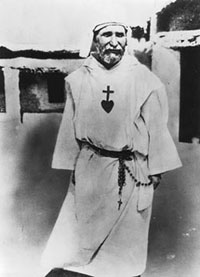 In 1956, many lucid and religious minds were turning to Fr. de Foucauld, the celestial protector of our Empire, remembering his grave forewarnings. Some of his texts were being passed around, in particular on the subject of the repression needed against every rebellion, and his figure increasingly dominated the thoughts of those who wanted to defend Algerian Christianity, which was threatened by barbaric fanaticism and world-wide subversion. The “ responsible ” religious authorities, however, took pains to disavow any “ politico-religious amalgamation ” !
In 1956, many lucid and religious minds were turning to Fr. de Foucauld, the celestial protector of our Empire, remembering his grave forewarnings. Some of his texts were being passed around, in particular on the subject of the repression needed against every rebellion, and his figure increasingly dominated the thoughts of those who wanted to defend Algerian Christianity, which was threatened by barbaric fanaticism and world-wide subversion. The “ responsible ” religious authorities, however, took pains to disavow any “ politico-religious amalgamation ” !
On June 12, 1956, the newspaper La Croix published a declaration of the three bishops in charge of Religious Congregations and Secular Institutes that formed the Association Charles-de-Jésus, Père de Foucauld :
« For several months now, newspapers and reviews have published letters of Fr. de Foucauld and unduly [sic !] apply them to the current situation. This is tantamount to unearthing texts, in the grip of passion, in order to justify one’s own position. This is not seeking information from someone in order to receive enlightenment from him. »
Unduly ? The analogy between the two situations, separated by fifty years, was, quite to the contrary, extraordinarily striking. When Fr. de Foucauld settled in the Hoggar in 1905, an age-old refuge for desert looters, the region was not safe. Those who were recalcitrant in their opposition to the French presence had taken refuge either in the west, in Morocco, or in the east, in Tripolitania. After the French occupied Morocco and the Italians settled in Tripolitania, implacable bands roused to fanaticism by the Senussi confraternity sought by all means to incite to violence all the rapacious individuals in these desert regions who were eager for raids, looting and murder. The Great War did nothing but make things worse when gold, weapons and German officers arrived.
In 1956, it was the same, but on a larger scale, with larger hotbeds of revolt in Morocco and Tunisia, directly or indirectly supported by the Arab League and Anglo-Saxon powers. There, FLN bands were taught, armed and fanaticised, before being sent into operations in Algerian maquis. Between them and our companies, it was no longer a question of a few hundred Touaregs to “ civilise ”, but nine million Muslims to protect.
The situation was thus more serious… and this would have increased Father de Fouauld’s zeal tenfold !
« Fr. de Foucauld used to call himself the “ universal Brother ”, our bishops continued, and called his residence the “ Fraternity ”. Some of his reactions are the product of the mentality of his contemporaries and the historical circumstances of Western penetration. Is it so amazing ? Let us not forget, however, that he was the brother of the black slaves in Béni-Abbès and fought for their freedom [from the yoke of enslavement of course ! not from colonial protection]; neither should we forget that he was the friend and brother of the Touaregs in Tamanrasset. If one wants to seek information from Brother Charles of Jesus, let him listen to the lesson of his whole life rather than unearth texts taken out of their historical context, and let him be ready to love all the men who surround us, as the Father loved all the inhabitants of Béni-Abbès and Tamanrasset, becoming their servant, their brother and their friend. »
This is Tolstoy-like evangelism and false charity that claims to rally all men, whoever they may be, by the flattering acceptation of their errors, toleration for their vices and esteem for their false religions !
Here is the pseudo-sociological justification for this new missiology :
« Our generation has witnessed great world-wide upheavals and, in suffering, men and people have awakened. The Catholic Church paid attention to this awakening, wanting to project on this evolution of the world the light that she received from Jesus Christ. »
To be the light of the world, “ Lumen gentium ”, in order to enlighten an “ evolution ” that was provoked by the pride and revolutionary passions that Satan was inspiring in colonised peoples : How could the Church betray her mission to this extent ?
While in Algeria, the image and message of Fr. de Foucauld was thus distorted, the investigation for his beatification was suspended in Rome, « because of the difficulties that arose between France and Algeria »...
THE FIGHT FOR CHRISTIANITY, « A WORK OF LOVE »
Fr. de Foucauld desired martyrdom, not only as the greatest proof of love he could give to his Beloved, but also to show to the most disinherited of infidels whose fate he shared that our religion is love, and to convert them : « With all my heart, I attempt to show, to prove to these poor, straying brothers that our religion is total charity, total brotherhood, and that its emblem is a heart. » (Letter to Fr. Huvelin, July 15, 1904)
In the same spirit, Fr. de Nantes wrote to Brother Bruno, on October 7, 1956 : « Every day, the vanity of worldly agitation is more and more obvious to me. Blissful immortality is to be found only in love of God, and neighbor for the sake of God. Thus, politics is nothingness if it is not based on this foundation. I am beginning to wrangle again. I am preparing my second article for L’Ordre français, but I can assure you that this fight is a work of love ».
What was at stake in this fight, which is both political and mystical, – the two are connected –; this second article forcefully recalled it by its title, which is quite explicit : “ To save an historical community ”. One community, not two, where there would be Europeans on one side and Muslims on the other; the colonial institution had united them over five or six generations, forging a thousand different bonds between them in an admirable reciprocity of services. There was still much progress to be made, but there had already come about a concrete, living and historical order, which is not debatable, and which must be saved, inasmuch as forces of evil work desperately to destroy it, from the inside as well as from the outside.
« I know that many ecclesiastics here and there, theologians from France and native members of the clergy, are taken in by this great dream : “ colonialism ” is considered a stain on the Church’s immaculate gown. If it were to disappear, her spiritual institutions would save the moral order. »
What can we say in answer to such a project ? Quite simply what the tradition of Church has always taught in the course of her missionary expansion : « Temptations of Jesus in the desert. The Church is not a political order. She cannot do without it, any more than she can dispense with natural morality; she rests on it and hallows it. To hurl oneself into space, no ! Jesus refused to do it for Satan. It would be good for missionaries and theologians to draw inspiration from this wisdom and, according to the very image, from this self-restraint. »
TO SAVE THE COLONIAL BOND
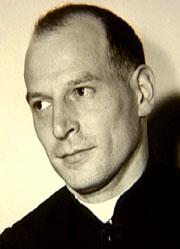 While denouncing the fatal effects of Christian progressivism, our Father was laying the foundations of a new colonial policy, a living one, because fully relational : « As soon as a new portion of what our moralists are ashamed to call the Empire becomes a stage where the colonial order is brought into question, we can immediately remark the fatal consequences : the disconnected parties return to their brutal egoism, the colonists to their interests, the natives to their desires for razzias or to their ambitions. The institution alone – and perhaps rather poorly, yet perhaps rather well – made them live one with others, one for the other. The abdication of the State, of public opinion and of the body of moralists suddenly makes them alien to one another… As long as the institution remained undisputed, the moralist could call them all back to this duty of mutual aid, to this mutual justice that is its underlying law; from the day that the institution is subject to the opinions and wishes of individuals, having started to falter, it loses its strength; morality has left these uninhabitable places in order to let fratricide and hatred prowl there. »
While denouncing the fatal effects of Christian progressivism, our Father was laying the foundations of a new colonial policy, a living one, because fully relational : « As soon as a new portion of what our moralists are ashamed to call the Empire becomes a stage where the colonial order is brought into question, we can immediately remark the fatal consequences : the disconnected parties return to their brutal egoism, the colonists to their interests, the natives to their desires for razzias or to their ambitions. The institution alone – and perhaps rather poorly, yet perhaps rather well – made them live one with others, one for the other. The abdication of the State, of public opinion and of the body of moralists suddenly makes them alien to one another… As long as the institution remained undisputed, the moralist could call them all back to this duty of mutual aid, to this mutual justice that is its underlying law; from the day that the institution is subject to the opinions and wishes of individuals, having started to falter, it loses its strength; morality has left these uninhabitable places in order to let fratricide and hatred prowl there. »
This « revolution » in the Empire bears a date : 1944; and has a charter, that of Brazzaville, the consequences of which were felt in Algeria in May 1945. Our Father nevertheless admired the fact that « the colonial bond » still held : « This bond was so deeply inscribed in souls and lived out in daily life that, until the explosion of revolutionary terror and despite it, the colonists remained faithful to their vocation, which they loved, and the best part of the native population attached to a customary order that they cannot resign themselves to see disappear. Here, the moralist salutes with emotion this noble fidelity that survives, deprived of all support. » We will see it manifest itself spontaneously and forcefully on May 13, 1958.
Conclusion : in order to save the « bond » that the Revolution desperately tries to destroy, it is necessary to go back to the principles and proclaim oneself counter-revolutionary. But some no longer desired to fight : « The harm is done, we cannot go back in time, they say. All that remains to be done is to tiptoe away – the liberated peoples will be somewhat grateful – or attempt compromise solutions that will safeguard the interests of Europeans. »
No ! Fr. de Nantes protested, if the bond of colonisation is called into question and even ruined in certain parts of the country « we must work to restore it, enthusiastically, powerfully, in the name of morality, for the temporal and spiritual good of all, inextricably… » This beautiful mission is incumbent upon moralists,first and foremost upon priests and religious : « You see, our civilisation has progressed and shone all the while that moralists supported the institutions of order without being frightened of any individual disorder, except to stigmatise it. They crowned kings, received the oaths of knights, gave Patron Saints to corporations, blessed the Crusaders and the discoverers of new lands. The Roman Church was at the head of this movement of trust. But kings oppressed, knights plundered, conquerors burned heaps of pagan corpses ! The moralists reprimanded the men, but they did not cease to impose and strengthen the respect due to the institutions. It is through their daring authority that order prevailed and established itself. Slowly, by means of this order, anarchic forces were channelled and tempered.
« On the contrary, our civilisation is in decline through the fault of moralists. They are wasted by an obscure evil, the contempt of institutions of order, the delirium of “ personalism ” [which places the human person above all, and the person of the rebel in preference to that of the colonist or the policeman]. Every personal fault is an occasion for them to condemn the institution, every imperfection of the “ good order ” appears to them to be an essential flaw, an additional reason to destroy respect for it in minds. »
To restore everything, we must start from this principle, forcefully affirmed by Fr. de Nantes : « France does not have the right to abandon the colonists or the natives, and her strictest moral duty is to safeguard order and justice within the community that they form without putting the principle into question[…]. »
Our Father had a presentiment of the tough combat to come:
« The Gospel has become, in the hands of clever propagandists, the best mental auxiliary of revolution. In France, it alone was able to erode the national morale to this extent. In the colonies it combines its authority with that of the Qur’an. As for me, a docile Catholic, I know that it is a question of a Gospel that is poorly understood and distorted. But what authority today can rise above the various religious affiliations in order to decide irrevocably ? »
Brother Michael of the Immaculate Triumphant
(1) Le martyre de l’armée française, 1962, p. 210
(2) Autopsie de la guerre d’Algérie, éd. France-Empire, 1972, p. 70
(3) René Rieunier, Réquisitoire contre le mensonge, p. 156
(4) Ibid., p. 159
(5) François Porteu de La Morandière, Soldats du djebel, p. 60
(6) Autopsie de la guerre d’Algérie, p. 81
(7) Quoted by Sybille Chapeu, p. 68
(8) La Croix January 13, 2007
(9) André Rossfelder, Le onzième commandement, 2000, p. 428
(10) Letter to My Friends n° 70, Easter 1960
(11) Histoire de la guerre d’Algérie, La Nef, 1962